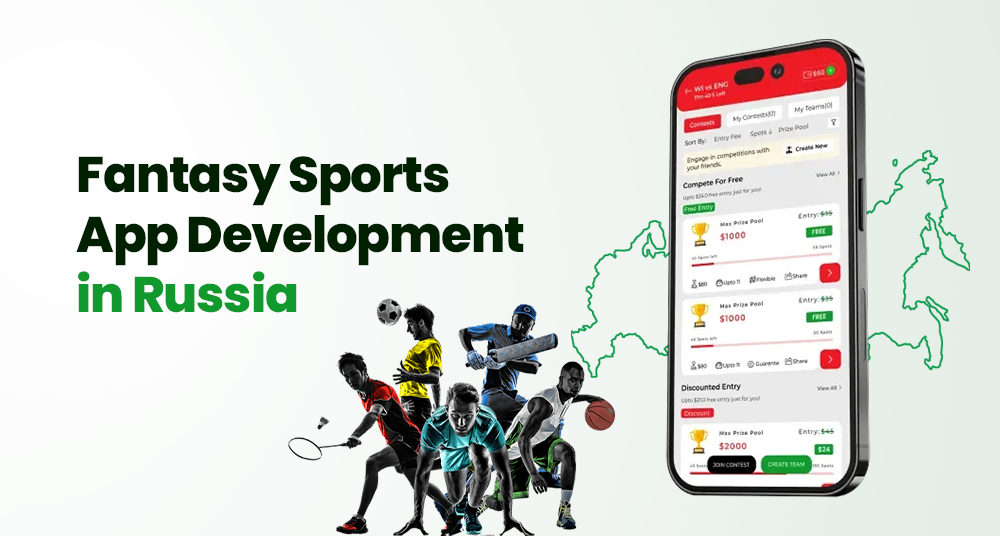The popularity of fantasy sports has soared globally, providing sports fans with a unique and exciting way to engage with their favorite games. Russia, with its rich sports culture and avid following of soccer, hockey, basketball, and esports, is increasingly becoming a promising market for fantasy sports apps. As mobile penetration and internet connectivity improve, the demand for digital entertainment options such as fantasy sports is expected to rise significantly.
Fantasy Sports App Development in Russia presents a significant opportunity for entrepreneurs and investors. However, creating a successful fantasy sports platform requires more than just technical know-how; it requires a deep understanding of the target market, regulatory environment, and user preferences. This guide outlines the essential steps for launching a fantasy sports app in Russia, covering everything from market opportunities to key features and technical considerations.
Why Invest in Fantasy Sports App Development in Russia?
Growing Sports Fanbase
Russia is home to millions of sports enthusiasts who are passionate about a wide variety of games. Football (soccer) is by far the most popular sport, with a dedicated fan base, but hockey, basketball, volleyball, and even esports have significant followings. With these enthusiastic sports fans comes an increasing appetite for platforms that allow them to engage with their favorite sports in new, interactive ways.
Rise of Mobile and Internet Usage
Russia has seen significant growth in internet penetration and mobile device usage. According to recent reports, nearly 90% of the population has access to the internet, and smartphones are ubiquitous, even in remote areas. This creates a fertile environment for mobile-based fantasy sports platforms to thrive, especially if they are designed to be user-friendly and responsive across a variety of devices.
Esports Boom
Esports is another burgeoning sector in Russia, particularly popular among younger generations. Fantasy sports apps targeting esports can tap into this market by offering fantasy leagues for games like Dota 2, League of Legends, and Counter-Strike. This presents a unique opportunity for developers to combine traditional fantasy sports with the rapidly growing esports industry.
Monetization Potential
Fantasy sports apps are often monetized through a combination of in-app purchases, subscription models, advertising, and entry fees for paid leagues. The growing interest in sports and online entertainment offers a substantial revenue stream for developers. Moreover, as Russian sports fans embrace digital platforms, fantasy sports can become a mainstream form of entertainment, driving even greater revenue potential.
Untapped Market
While fantasy sports have gained traction in countries like the US, India, and the UK, Russia’s market remains relatively untapped. This represents an early-mover advantage for developers looking to introduce fantasy sports apps and establish themselves as market leaders.
Key Features of Fantasy Sports Apps
To develop a competitive fantasy sports app in Russia, it is crucial to incorporate features that cater to the needs and expectations of the user base. Below are some essential features that should be considered:
User Registration and Profile
A streamlined user registration process that allows users to sign up easily with their email, social media accounts, or phone numbers is crucial for onboarding. Profiles should allow users to track their participation in leagues, monitor performance, and update personal preferences.
Fantasy League Creation and Management
Users should be able to create and manage custom fantasy leagues. The app should allow users to choose from various sports and create leagues based on those sports. The process should be intuitive, allowing league commissioners to invite players, set league rules, and configure points systems.
Real-Time Scoring and Updates
Live scoring, real-time updates, and notifications are key to keeping users engaged. As games progress, users should be able to track their team’s performance, see how their fantasy players are performing, and adjust their lineup if needed. Push notifications should alert users about changes in scores, injuries, and game outcomes.
Drafting System
One of the core elements of any fantasy sports app is the player drafting system. This should be an engaging, fair, and user-friendly process, allowing users to draft their teams either through an auto-pick system or manual selection. The system should also allow for auctions, trades, and player waivers, offering flexibility in managing teams.
Payment Integration
Integrating secure payment systems is essential for handling league entry fees, prize money, and in-app purchases. It is also necessary for the app to support multiple payment methods, including credit cards, e-wallets, and popular Russian payment systems such as Qiwi or Yandex Money.
Social and Community Features
The social aspect of fantasy sports plays a huge role in user engagement. The app should include features that allow users to chat with other players, form private leagues, share updates on social media, and interact with other members of the community. In-app leaderboards, achievement badges, and social sharing can foster healthy competition and user retention.
Data Analytics and Player Insights
Advanced statistics and data analytics are integral for providing users with valuable insights. Fantasy sports apps should provide detailed player statistics, game previews, injury reports, and performance metrics. This will help users make informed decisions when building their fantasy teams.
User-Friendly Interface
A clean, intuitive, and responsive UI is crucial for the success of a fantasy sports app. The app should be easy to navigate, with an attractive design that appeals to users of all ages. Since many users will access the app on mobile devices, it must be optimized for both Android and iOS platforms.
Important Considerations for Building a Fantasy Sports App
Legal and Regulatory Landscape
Before launching a fantasy sports app in Russia, it is important to understand the country’s legal and regulatory framework. Gambling laws in Russia are strict, and any platform involving money, such as fantasy sports leagues that charge entry fees, must comply with local regulations. Make sure the app’s operations are in line with Russian law to avoid potential legal issues.
Localization
Localization is essential to ensure that your fantasy sports app resonates with the Russian audience. This involves translating the app into Russian, adjusting the design to reflect local preferences, and including region-specific sports, teams, and competitions. Additionally, ensure that the app is integrated with local payment gateways and follows local taxation rules.
Data Privacy and Security
Protecting user data and ensuring privacy is critical, especially in an age where data breaches are becoming more common. Russian users will be sensitive to how their personal and financial information is handled. The app must comply with the Russian data protection laws and incorporate secure encryption methods, such as HTTPS and SSL, to safeguard users’ personal information.
Scalability
As your fantasy sports app gains popularity, you must ensure that it is scalable to handle large volumes of traffic. Whether it’s millions of daily users or massive traffic during peak sports events, the app should be able to scale seamlessly without compromising performance.
Monetization Strategy
When it comes to monetization, there are several strategies you can implement:
- Freemium Model: Offer the app for free with in-app purchases or premium features.
- Entry Fees: Charge users a fee to participate in paid leagues with cash prizes.
- Subscription: Offer subscription plans for enhanced features, such as expert insights, premium player statistics, and ad-free experiences.
- Advertisements: Partner with brands for targeted advertisements within the app.
Fantasy Sports App Development Process
The process of Fantasy Sports App Development in Russia generally involves the following stages:
Market Research and Conceptualization
The first step is to understand the market and your target audience. This includes studying local sports culture, identifying popular sports leagues, understanding user needs, and analyzing competitors. During this phase, you’ll define the features of your app, develop the concept, and plan your app’s user journey.
Design and Development
Once the concept is defined, the design phase begins. The UI/UX team will work on creating a seamless and intuitive design for both the app and its backend. The development team will start coding, ensuring that the app works flawlessly across platforms.
Testing and Quality Assurance
Quality assurance is crucial for ensuring a bug-free user experience. During this phase, the app undergoes various rounds of testing to identify and fix any issues. This includes functional testing, performance testing, security testing, and user acceptance testing.
Launch and Marketing
Once the app is ready, it will be launched on the App Store and Google Play Store. A solid marketing strategy, including social media campaigns, influencer collaborations, and targeted ads, is essential to reach potential users. Engaging with local sports communities and sponsoring events can also help increase visibility.
Post-Launch Support and Updates
After the launch, continuous monitoring and feedback gathering are essential. Regular updates, bug fixes, and new feature releases are necessary to keep users engaged. Additionally, the app should offer customer support to handle any issues or concerns.
Useful Resource: “Fantasy Sports App Development Guide“
Final Thoughts
The fantasy sports app market in Russia is on the verge of significant growth, fueled by a passionate sports fanbase, increasing mobile penetration, and a favorable digital environment. However, creating a successful fantasy sports platform requires careful planning, strategic execution, and an understanding of both technical and market factors.
By focusing on user experience, integrating essential features, and navigating legal considerations, you can develop a competitive fantasy sports app that resonates with Russian users and stands out in a growing market.



